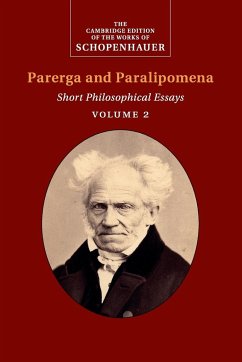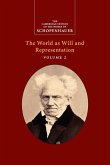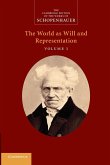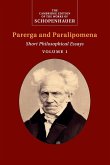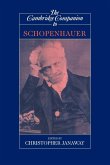- Broschiertes Buch
- Merkliste
- Auf die Merkliste
- Bewerten Bewerten
- Teilen
- Produkt teilen
- Produkterinnerung
- Produkterinnerung
A new translation of Schopenhauer's collection of popular philosophical essays, featuring a substantial introduction explaining the context of the essays, and extensive editorial notes on the different published versions of the work. Essential for those studying Schopenhauer, the history of philosophy, and nineteenth-century German philosophy.
Andere Kunden interessierten sich auch für
![Schopenhauer Schopenhauer]() Arthur SchopenhauerSchopenhauer52,99 €
Arthur SchopenhauerSchopenhauer52,99 €![Schopenhauer Schopenhauer]() Schopenhauer48,99 €
Schopenhauer48,99 €![Schopenhauer Schopenhauer]() Arthur SchopenhauerSchopenhauer44,99 €
Arthur SchopenhauerSchopenhauer44,99 €![Schopenhauer and the Aesthetic Standpoint Schopenhauer and the Aesthetic Standpoint]() Sophia VasalouSchopenhauer and the Aesthetic Standpoint92,99 €
Sophia VasalouSchopenhauer and the Aesthetic Standpoint92,99 €![Schopenhauer Schopenhauer]() David E. Cartwright (Whitewater University of Wisconsin)Schopenhauer47,99 €
David E. Cartwright (Whitewater University of Wisconsin)Schopenhauer47,99 €![The Cambridge Companion to Schopenhauer The Cambridge Companion to Schopenhauer]() Christopher Janaway (ed.)The Cambridge Companion to Schopenhauer43,99 €
Christopher Janaway (ed.)The Cambridge Companion to Schopenhauer43,99 €![Essays and Aphorisms Essays and Aphorisms]() Arthur SchopenhauerEssays and Aphorisms12,99 €
Arthur SchopenhauerEssays and Aphorisms12,99 €-
-
-
A new translation of Schopenhauer's collection of popular philosophical essays, featuring a substantial introduction explaining the context of the essays, and extensive editorial notes on the different published versions of the work. Essential for those studying Schopenhauer, the history of philosophy, and nineteenth-century German philosophy.
Hinweis: Dieser Artikel kann nur an eine deutsche Lieferadresse ausgeliefert werden.
Hinweis: Dieser Artikel kann nur an eine deutsche Lieferadresse ausgeliefert werden.
Produktdetails
- Produktdetails
- The Cambridge Edition of the Works of Schopenhauer
- Verlag: Cambridge University Press
- Seitenzahl: 702
- Erscheinungstermin: 22. Juni 2017
- Englisch
- Abmessung: 229mm x 152mm x 37mm
- Gewicht: 1012g
- ISBN-13: 9781108436526
- ISBN-10: 1108436528
- Artikelnr.: 48809731
- Herstellerkennzeichnung
- Libri GmbH
- Europaallee 1
- 36244 Bad Hersfeld
- gpsr@libri.de
- The Cambridge Edition of the Works of Schopenhauer
- Verlag: Cambridge University Press
- Seitenzahl: 702
- Erscheinungstermin: 22. Juni 2017
- Englisch
- Abmessung: 229mm x 152mm x 37mm
- Gewicht: 1012g
- ISBN-13: 9781108436526
- ISBN-10: 1108436528
- Artikelnr.: 48809731
- Herstellerkennzeichnung
- Libri GmbH
- Europaallee 1
- 36244 Bad Hersfeld
- gpsr@libri.de
German philosopher Arthur Schopenhauer was born in 1788 and died on September 21, 1860. Although Schopenhauer's work received little attention while he was alive, it had an influence on several fields after his death, including science, literature, and philosophy. Numerous writers and artists have been impacted by his writing on psychology, ethics, and aesthetics. At the age of 88, Arthur Schopenhauer passed away in Paris in 1848. He was born in Danzig, Germany, in 1788 on Heiligegeistgasse. He was the son of Heinrich Floris Schopenhauer (1747-1805) and Johanna Schopenhauer (née Trosiener; 1766-1838), who were both descended from affluent German-Dutch aristocratic families. Arthur was brought to Le Havre in 1797 to live with Grégoire de Blésimaire's family, a business acquaintance of his father's. In 1811-1812, Schopenhauer studied philosophy at the recently established University of Berlin. Schopenhauer periodically mentioned his wish to get married and start a family when he was living in Berlin. He had an on-and-off relationship with Caroline Richter, who had had numerous lovers and a son out of wedlock. After arriving in Frankfurt, he went through a depressive episode and his health deteriorated. He passed away at home, seated on his sofa, on September 21, 1860, from pulmonary-respiratory failure. He passed away at the age of 72, and a Lutheran preacher officiated at his funeral.
General editor's preface
Editorial notes and references
Introduction
Notes on text and translation
Chronology
Bibliography
Parerga and Paralipomena, Volume 2: Sporadic yet systematically ordered thoughts on multifarious topics
1. On philosophy and its method
2. On logic and dialectic
3. Some thoughts concerning the intellect in general and in every respect
4. Some observations on the antithesis of the thing in itself and the appearance
5. Some words on pantheism
6. On philosophy and natural science
7. On colour theory
8. On ethics
9. On jurisprudence and politics
10. On the doctrine of the indestructibility of our true essence by death
11. Additional remarks on the doctrine of the nothingness of existence
12. Additional remarks on the doctrine of the suffering of the world
13. On suicide
14. Additional remarks on the doctrine of the affirmation and negation of the will to life
15. On religion
16. Some remarks on Sanskrit literature
17. Some archaeological observations
18. Some mythological observations
19. On the metaphysics of the beautiful and aesthetics
20. On judgment, criticism, approbation and fame
21. On learning and the learned
22. Thinking for oneself
23. On writing and style
24. On reading and books
25. On language and words
26. Psychological remarks
27. On women
28. On education
29. On physiognomy
30. On noise and sounds
31. Similes, parables and fables
Some verses
Versions of Schopenhauer's text
Glossary of names
Index.
Editorial notes and references
Introduction
Notes on text and translation
Chronology
Bibliography
Parerga and Paralipomena, Volume 2: Sporadic yet systematically ordered thoughts on multifarious topics
1. On philosophy and its method
2. On logic and dialectic
3. Some thoughts concerning the intellect in general and in every respect
4. Some observations on the antithesis of the thing in itself and the appearance
5. Some words on pantheism
6. On philosophy and natural science
7. On colour theory
8. On ethics
9. On jurisprudence and politics
10. On the doctrine of the indestructibility of our true essence by death
11. Additional remarks on the doctrine of the nothingness of existence
12. Additional remarks on the doctrine of the suffering of the world
13. On suicide
14. Additional remarks on the doctrine of the affirmation and negation of the will to life
15. On religion
16. Some remarks on Sanskrit literature
17. Some archaeological observations
18. Some mythological observations
19. On the metaphysics of the beautiful and aesthetics
20. On judgment, criticism, approbation and fame
21. On learning and the learned
22. Thinking for oneself
23. On writing and style
24. On reading and books
25. On language and words
26. Psychological remarks
27. On women
28. On education
29. On physiognomy
30. On noise and sounds
31. Similes, parables and fables
Some verses
Versions of Schopenhauer's text
Glossary of names
Index.
General editor's preface
Editorial notes and references
Introduction
Notes on text and translation
Chronology
Bibliography
Parerga and Paralipomena, Volume 2: Sporadic yet systematically ordered thoughts on multifarious topics
1. On philosophy and its method
2. On logic and dialectic
3. Some thoughts concerning the intellect in general and in every respect
4. Some observations on the antithesis of the thing in itself and the appearance
5. Some words on pantheism
6. On philosophy and natural science
7. On colour theory
8. On ethics
9. On jurisprudence and politics
10. On the doctrine of the indestructibility of our true essence by death
11. Additional remarks on the doctrine of the nothingness of existence
12. Additional remarks on the doctrine of the suffering of the world
13. On suicide
14. Additional remarks on the doctrine of the affirmation and negation of the will to life
15. On religion
16. Some remarks on Sanskrit literature
17. Some archaeological observations
18. Some mythological observations
19. On the metaphysics of the beautiful and aesthetics
20. On judgment, criticism, approbation and fame
21. On learning and the learned
22. Thinking for oneself
23. On writing and style
24. On reading and books
25. On language and words
26. Psychological remarks
27. On women
28. On education
29. On physiognomy
30. On noise and sounds
31. Similes, parables and fables
Some verses
Versions of Schopenhauer's text
Glossary of names
Index.
Editorial notes and references
Introduction
Notes on text and translation
Chronology
Bibliography
Parerga and Paralipomena, Volume 2: Sporadic yet systematically ordered thoughts on multifarious topics
1. On philosophy and its method
2. On logic and dialectic
3. Some thoughts concerning the intellect in general and in every respect
4. Some observations on the antithesis of the thing in itself and the appearance
5. Some words on pantheism
6. On philosophy and natural science
7. On colour theory
8. On ethics
9. On jurisprudence and politics
10. On the doctrine of the indestructibility of our true essence by death
11. Additional remarks on the doctrine of the nothingness of existence
12. Additional remarks on the doctrine of the suffering of the world
13. On suicide
14. Additional remarks on the doctrine of the affirmation and negation of the will to life
15. On religion
16. Some remarks on Sanskrit literature
17. Some archaeological observations
18. Some mythological observations
19. On the metaphysics of the beautiful and aesthetics
20. On judgment, criticism, approbation and fame
21. On learning and the learned
22. Thinking for oneself
23. On writing and style
24. On reading and books
25. On language and words
26. Psychological remarks
27. On women
28. On education
29. On physiognomy
30. On noise and sounds
31. Similes, parables and fables
Some verses
Versions of Schopenhauer's text
Glossary of names
Index.

